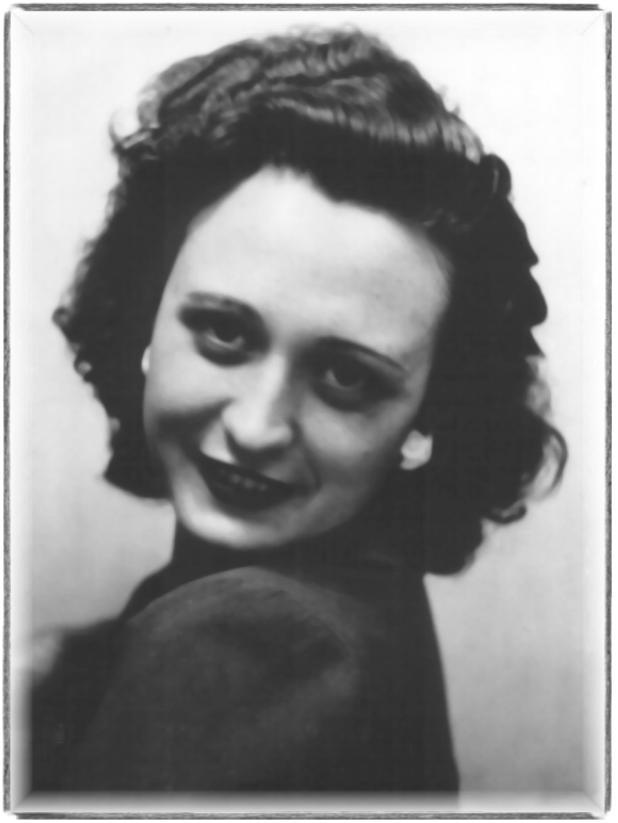by Jacqueline Ashland,
Westring 48, 63691 Ranstadt, Germany

My memories of World War II are both a combination of
sadness, and of bitter sweet memories of our struggles for survival
and ultimate peace. On September 1939, Hitler declared
war on France. The city that I was born and lived in for
all of my life, was now under siege.
 Strasbourg, which
lies on the French side of the Rhein River, bordering Germany,
was a
strategic gateway to the South for Hitler's Third Reich
expansion plans.
Strasbourg, which
lies on the French side of the Rhein River, bordering Germany,
was a
strategic gateway to the South for Hitler's Third Reich
expansion plans.
Before the Germans arrived, we were evacuated to central
France. Some o f us went to Bordeaux, others to the Loire
Valley. Most of the people of Strasbourg went to
Chateauraix. I was thirteen-years old and went to school
in this non-industrial city. In 1940, on a beautiful
Summer day, I passed my final exam. The tranquility and
safety that we felt was soon disrupted, as strafing low flying
airplanes and bombs destroyed the town's railroad station. The enemy was
searching for the airport and missed its target. On this day,
without any forewarning, more than 100 innocent victims were
killed. All were buried in a common grave and at 14:00, the
Mayor solemnly hung the white flag on the top roof of the
railroad station. At this site, workers were waiting to
catch the region train on a Friday afternoon to return to
their families in the country. They never saw their
loved ones again.
f us went to Bordeaux, others to the Loire
Valley. Most of the people of Strasbourg went to
Chateauraix. I was thirteen-years old and went to school
in this non-industrial city. In 1940, on a beautiful
Summer day, I passed my final exam. The tranquility and
safety that we felt was soon disrupted, as strafing low flying
airplanes and bombs destroyed the town's railroad station. The enemy was
searching for the airport and missed its target. On this day,
without any forewarning, more than 100 innocent victims were
killed. All were buried in a common grave and at 14:00, the
Mayor solemnly hung the white flag on the top roof of the
railroad station. At this site, workers were waiting to
catch the region train on a Friday afternoon to return to
their families in the country. They never saw their
loved ones again.
As Hitler's troops continued Southward, Chateauraix
capitulated. The bombing stopped and two days later the
streets were quiet, almost as if the city had never
existed. While most families hid inside their homes, my
mother who spoke fluent German and understood the German
customs, decided to go out and confront the occupying
forces. It was then that a soldier passing by greeted
her in German. She responded and a few hours later, he
returned with an assortment of food and beverages to combat
our hunger.
Since Paris was surrounded, we were ready
to go back to our homeland - Alsace. The
city officials of Chateauraix called the Alsatians
together and transported us in cattle trains
back to Strasbourg. Before the train
departed, stones were thrown against the trains,
because some of the Alsatian women became too
close to the German soldiers. Those who had affairs with the enemies had their hair
shaved and considered traitors
to France - a stigma which would remain
with them long after the war was over. As we
entered Strasbourg, the city was a ghost town
and we were welcomed with with abandoned
buildings and empty stores.
Germany occupied
France until 1944. Because my two brothers
refused to conscripted in the German Army, they
escaped before they would be forced to fight
against their countrymen. My oldest
brother, who later became the Chief Editor of Le
Monde in Paris, went in exile to
Switzerland. From there he traveled to
England and assisted De Gaulle build the
Liberation Army or the Resistance
Movement. My other brother, who changed
his name, went to work in Marseilles, where he
started a new life and eventually after the war
introduced one of the most successful
Import/Export distributions. The Gestapo interrogated
my mother on my brothers whereabouts, but she
refused to let out any information, which surely
would have jeopardized their existence. My
Aunt in Switzerland (Zurich) wrote us that the
"surgery" (secret code) of my brothers were successful, so we
knew that they were safe.
My
father was less fortunate, as he was taken
Prison of War for 13 months at the Stuthof Concentration
Camp in Alsace.
As
the war continued and the French Resistance grew
stronger, French nationalism strengthened.
German collaborators were shot by the
Resistance. Since I spoke English fluently
in German-occupied Alsace, I was forced to work
in the Perdrix Werke, the German Telephone
factory. As the Americans liberated Alsace,
bombs were dropped on the factory and we hid in
the bunker in the basement. A water pipe
broke and we were lucky not to have
drowned. Others were not as lucky, as my
sister-in-law lost both of her parents who
sought shelter, which was bombed and all were
killed.
How did we survive
the Nazi tyranny? We survived through perseverance
that one day the Liberators and the Allies
would save us and that peace would prevail. These
are just a few of my experiences and memories of
a past, which I pray is never
repeated.
_____________________________
For
those wishing to print their stories please send
a completed summary and photos to militarypm@militarypartners.com
We will send all published articles a
commemorative MilitaryPartners Pen and T-shirt.